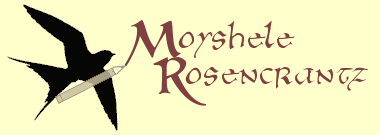If ever there was a Yiddish song that proved the Jewish people were
influenced by Ukranian folk songs, this must be it. The theme is
characteristic of folk songs: "My youth has fled. Oy vey. And I didn't
even carpe diem!" The melody is so typical of Eastern European folk
songs, that it's almost strange to hear it sung in Yiddish. You'd expect
it to be sung by three lovely young Ukranian peasant girls, dressed in
beautiful white dresses embroidered with red, blue and yellow patterns,
smiling brightly, and singing in perfect harmony with nasal voices
(apparently, singing through the nose helped project the sound farther
out to the wedding guests in the days preceding amplifiers and
microphones). Anyway, here it is, with my best attempt at a nasal
folksinger's voice.
| Over the hill, across the hill | Afn barg, ibern barg | אױפֿן באַרג, איבערן באַרג |
| Doves are flying in pairs | Flien toybn porn | פֿליען טױבן פּאָרן |
| I haven't yet known any pleasure | Kh'hob nokh keyn nakhes nit gehat | כ'האָב נאָך קײן נחת ניט געהאַט |
| And already my youth is gone | Avek mayne yunge yorn | אַװעק מײנע יונגע יאָרן |
|
|
|
| Harness the black horses my brothers | Shpant zhe brider di shvartse ferd | שפּאַנט זשע ברידער די שװאַרצע פֿערד |
| And let us run and travel | Un lomir loyfn, forn | און לאָמיר לױפֿן, פֿאָרן |
| Maybe I'll manage yet to overtake | Efsher vel ikh nokh deryogn | אפֿשר װעל איך נאָך דעריאָגן |
| My young years | Mayne yunge yorn | מײַנע יונגע יאָרן |
|
|
|
| I met the young years | Kh'hob bagegnt di yunge yorn | כ'האָב באַגעגענט די יונגע יאָרן |
| On the wide bridge | Af dem breytn brik | אױף דעם ברײטן בריק |
| Years, years, come back again | Yorn, yorn, kert zikh um | יאָרן, יאָרן, קערט זיך אום |
| Even if only as guests | Khotsh in gest tsurik | כאָטש אין געסט צוריק |
|
|
|
| No, no, we won't go | Neyn, neyn, mir veln nit geyn | נײן, נײן, מיר װעלן ניט גײן |
| Who would we go back for? | S'iz nito tsu vemen | ס'איז ניטאָ צו װעמען |
| You shouldn't have | Host undz nit gezolt | האָסט אונדז ניט געזאָלט |
| Humiliated us in your youth! | Yungerhayt farshemn | יונגערהײט פֿאַרשעמן |
 |
| This
Jewish theatre photo, with a woman who looks remarkably like Molly
Picon, appears whenever I open "Avek di yunge yorn" in my VLC media player. I've no idea how VLC selects the photos to show, but it's obviously not at random! |
There's one Yiddish word in this song that's a bit difficult to translate:
nakhes (נחת). The singer complains that he hasn't yet known any
nakhes
and already his youth is gone. Beinfeld and Bochner's bilingual
dictionary translates it as "pleasure, satisfaction, delight". But
there's something more in the word
nakhes - it shares a root with the Hebrew words
nakh, ("resting") and
menukha
("rest"). It gives off an aura of peace and tranquility, as well as
pleasure. It is also used to express pleasure and pride in somebody,
especially a child or grandchild, when he is well behaved, polite and
learns well, as in Sholem Aleykhem's famous ironic monologue, "nakhes
fun kinder" (pleasure from children). My
grandfather Lova
often used to exclaim, "Oy shtik nakhes!" while we were gardening
together. Even though I spoke no Yiddish at the time, I remembered the
expression many years later. According to my mother, he used this as a
term of endearment to myself, as the person giving him
nakhes, just as an American grandfather might call his grandson "honey". I chose to translate
nakhes below as "pleasure", but this leaves out some of the nuances.
Acknowledgements
Many thanks to:
- Eleanor Chana Mlotek, for publishing the lyrics and music to this song in her anthology, "Mir Trogn a Gezang"
- foxen10 for the horse's whinny
- tgfcoder for the doves cooing outside his window
- Audacity for making it possible for me to mix all of the tracks together!
- Sholem Jozef, for reviewing and correcting my translation



This is wonderful! I've listened several times and have enjoyed it immensely.
ReplyDeleteThanks Elly. I'm delighted you've enjoyed it! I'll try to find the time to record a few more of my Yiddish favorites :)
Delete